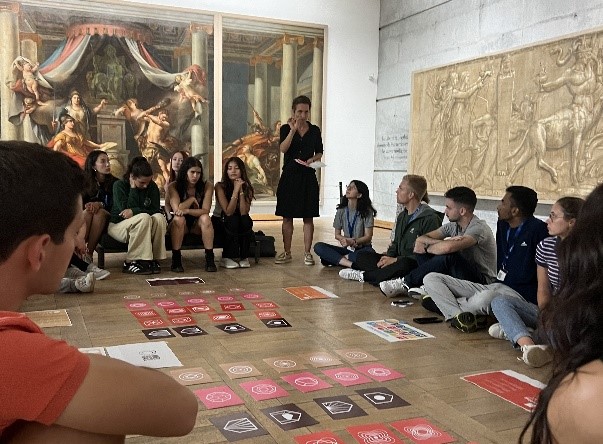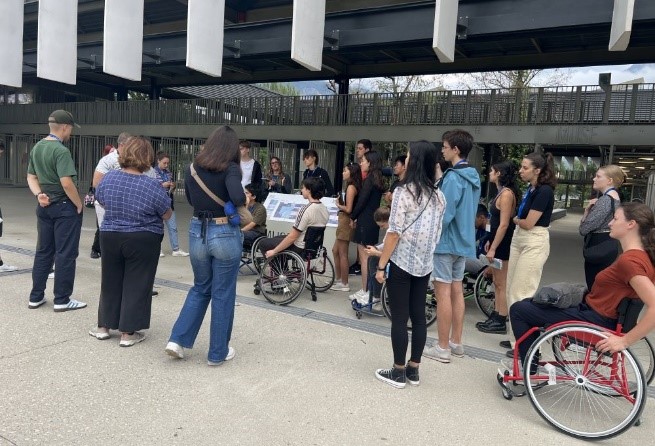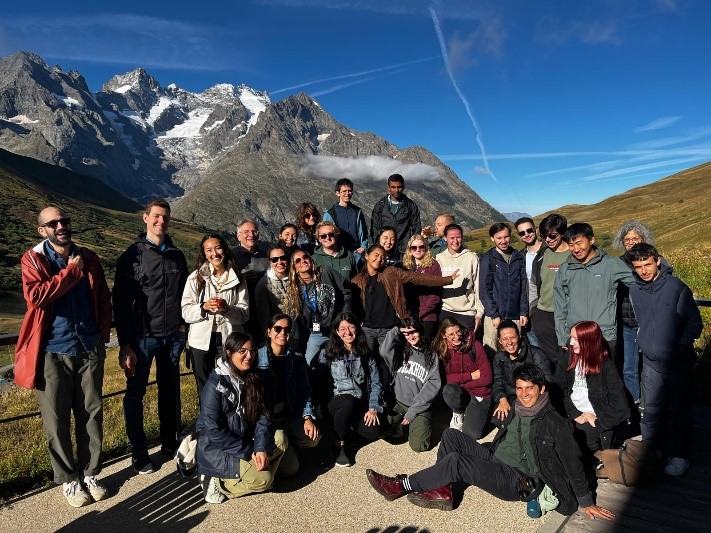
On September 1, 2024, 28 students from the 9 Unite! universities met in Barcelona thanks to Interrail passes, for the first official stage of their journey aboard the U! Train. On this first day, they were welcomed by Lourdes Reig, VP International Relations and political representative of Unite! for the Universitat Politecnica de Catalunya. Subsequently, icebreaker activities, a conference on sustainability in Europe by Prof. Gemma Cervantes, and a treasure hunt in downtown Barcelona were offered.
On September 2, participants attended a Living Lab workshop where they could share and analyze data from their journey and train experience. They completed a mapathon to make an exhaustive analysis of the current situation of the rail network. The objective was to detect those strengths and shortcomings at all levels of it.
Mapathon is a citizen science tool developed by UPC and open to everyone that allows the collaborative geolocation of accessibility problems in a specific area, in real time from the web, through a mobile device. These points are mapped together on the same map. The contributions of all participants are collected and a unique report was generated where the entries of the identified points are classified. Through this tool, students identified and maped the critical points of the route they did during their experience travelling by train through Europe, in what will be a transformative action that allowed to identify more than 100 problematic points. This Living Lab was followed by a conference on the future of rail mobility in Europe, by Adrián Fernández Carrasco, Director of Sustainability at Renfe and Lluís Monjo, UPC teacher. The session was facilitated by Dídac Ferrer and Eva Vendrell (UPC staff), and Pol Sabaté (Student Liasion Officer at UPC). At 1:30 PM, the train departure for Grenoble via Valence was whistled. During their journeys, participants were able to work on ideas for inter-university collaborative projects. Once arrived in Grenoble, they were able to fully enjoy the program designed by professors from Unite! partner universities.
The program included modules on Multiculturalism by Björn Kjellgren (KTH) and Sophie Bélanger (Grenoble INP - UGA), environmental and social responsibility by Faruk Ulgen (UGA), innovations in transportation by Carlos Casanueva (KTH), and rail logistics by Igor Gisterek (Wroclaw Tech). The program also reserved some unusual activities for participants. Indeed, it was in an exceptional setting, inside the Château de Vizille, that Lucie Jiraskova lead a workshop around Inner Development Goals.
Also, on September 5, students were welcomed to the MUSE building on the Saint Martin d'Hères university campus for an immersive course aimed at exploring urban walkability in a practical and experiential way. Students used devices simulating different types of reduced mobility, such as wheelchairs, to better understand accessibility challenges on campus, in the city, and in public transport.


Alongside the courses, a visit to the city of Grenoble through its street art works was organized as well as an excursion to the Lautaret garden, an exceptional place located at 2100 meters altitude where 2000 mountain species from around the world are planted and which welcomes international researchers throughout the year.
The students left delighted with their experience, as did the organizers of the U!Train. Given this success, there's a good chance that the U!Train will roll again in Europe next year.

Elisa Hausherr, Project Coordinator and Student Liaison Officer in Grenoble :
"I was very happy to see this project come to fruition after long preparation, to meet the students, see them arrive in Barcelona, then travel together to Grenoble. This group quickly bonded, and throughout their journey, they met challenges with enthusiasm. In particular, students were able to map more than 200 problematic points in the European rail network. This project is very interesting, not only for its educational and innovative quality but also because it allows participants to live their commitment to sustainability and cultural openness, and not just talk about it in a course. Moreover, it creates a real sense of community and belonging to Unite!"


